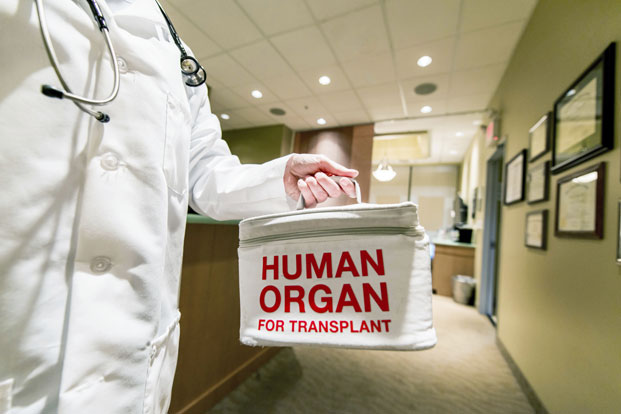There is always a long waiting list for organ transplants, and in the United States, it currently tops 122,000, according to government statistics. However, many of those on the list will never receive the phone call that can potentially extend their lives. That’s because the list of those willing to donate an organ is a lot shorter than the list of those needing one.
The reasons for that disparity are complex. They include not wanting to plan for death, squeamishness about having the body carved up post-mortem, religious objections, unexpected death from an accident or perhaps ignorance of the need. Whatever the reason, it is a real issue in the medical community, and it is a difficult one to confront for families, clergy and others.
About 6,500 people per year in need of livers, hearts, kidneys or other vital organs die before a suitable donor becomes available. Most donations come from the deceased, so an organ donor card is the only way for many medical facilities to know your post-death wishes. There are about 6,000 donations per year from healthy people donating a kidney or other replaceable organ, but that’s a small percentage of the need.
Common Misconceptions about Organ Donation
Many more people would consider donating an organ, medical professionals feel, if they truly understood the purpose of the generous decision. But the misinformation, superstitions and rumors surrounding organ donation must be dispelled.
Here are some common questions and answers about organ donation.
CONCERN: Organ donors are not given the same quality of care as those who do not agree to donate.
REALITY: Quality of medical care is not a factor. Medical professionals are just that — professional. They take the Hippocratic Oath, vowing to do no harm and preserving life whenever and wherever possible.
CONCERN: There are many people declared dead who are misdiagnosed and wake up.
REALITY: Organ donors are given extra medical tests to determine their status before any procedures are done. These tests are thorough and are performed at no cost to the donor’s family.
CONCERN: Organ donation is forbidden by most religions.
REALITY: Roman Catholicism, Islam, most Protestant faiths and most branches of Judaism allow organ donations. A cleric can explain and reassure you if you object for religious reasons.
CONCERN: My age will preclude me from being an organ donor.
REALITY: This is true if you are younger than 18. But minors can expressly convey their wishes to their parents, who consent to act in their children’s stead. Children can be organ donors as well as adults, and there is a critical need for younger donors because adult organs can be too large. As far as the elderly, age is no barrier to becoming an organ donor. The key is health. Many organ donors are in their 60s or 70s.
CONCERN: An open-casket funeral will no longer be an option for an organ donor.
REALITY: There is much preservation work that a skilled funeral home director can do. Clothing usually covers any organ and tissue donation locations, and morticians can insert rods to mimic the body when bones are donated. Skin donation is usually done from a back layer of skin, which is not visible to observers.
CONCERN: I have many medical issues. My organs would be of no value.
REALITY: Doctors have strict guidelines for which organs are viable for transplantation. While some of the proposed organs may not work, other tissues and organs may be perfectly suitable. The first task is making your body available. Medical professionals can make the call after death on whether there is a way to harvest anything of value.
CONCERN: I would donate a kidney, but there is a law that bars me from doing so unless it’s for a family member.
REALITY: The law has changed from the days when only relatives could donate to each other. Now there is no restriction on who will receive the organ as long as the donor is healthy and medical professionals determine that living with one kidney will not adversely affect the donor’s health.
CONCERN: My family can’t afford the additional costs associated with organ donation.
REALITY: There is no charge to the donor or his or her survivors. This myth arose because of the standard confusion regarding hospital bills. Costs for anything associated with organ transplant are borne by the recipient of the organ, not the donor or their family.
CONCERN: My family would be traumatized enough by my death. Making a donation would only exacerbate that misery.
REALITY: It is estimated that the average donor can have an impact on 50 lives. Knowing that their loved one helped someone in need is often a great comfort to survivors.
CONCERN: I have a rare blood type. Finding a match won’t be easy.
REALITY: While transplantation is easier if blood types match, there are tests that can determine whether mismatched blood types are a bar to organ exchanges. These will be performed to determine viability if there is an organ available.
CONCERN: I have HIV infection or another serious underlying illness. I am not eligible.
REALITY: This is correct in many cases. Such conditions as cancer, HIV, kidney disease, heart disease or other conditions may make the donor ineligible. However, in February 2016, it was announced that Johns Hopkins has been authorized to perform the first HIV-positive to HIV-positive organ transplant in the United States as soon as eligible candidates are available.
How to Donate Organs
The best way to ensure that your post-death wishes about organ donation are observed is to fill out an organ donor card (some states allow it to be done when registering to vote or for driver’s license renewal) and to make your wishes known to your family. Hospitals will ask relatives for consent, but it usually is a formality if the deceased has been registered.
There is also a donor registry in many states that tracks donors and is available to medical professionals. More information is available at OrganDonor.gov.

Leave a Reply